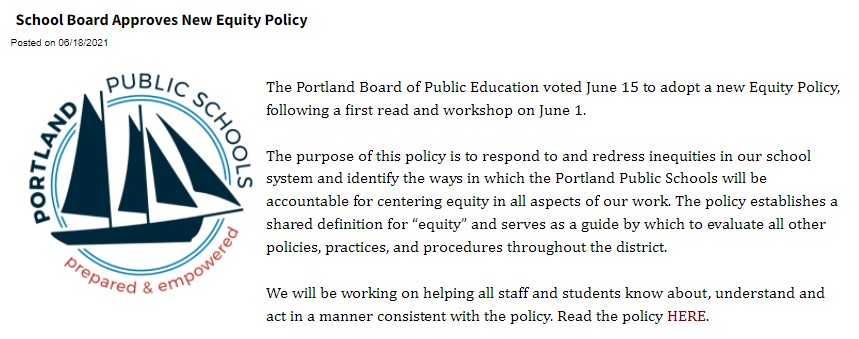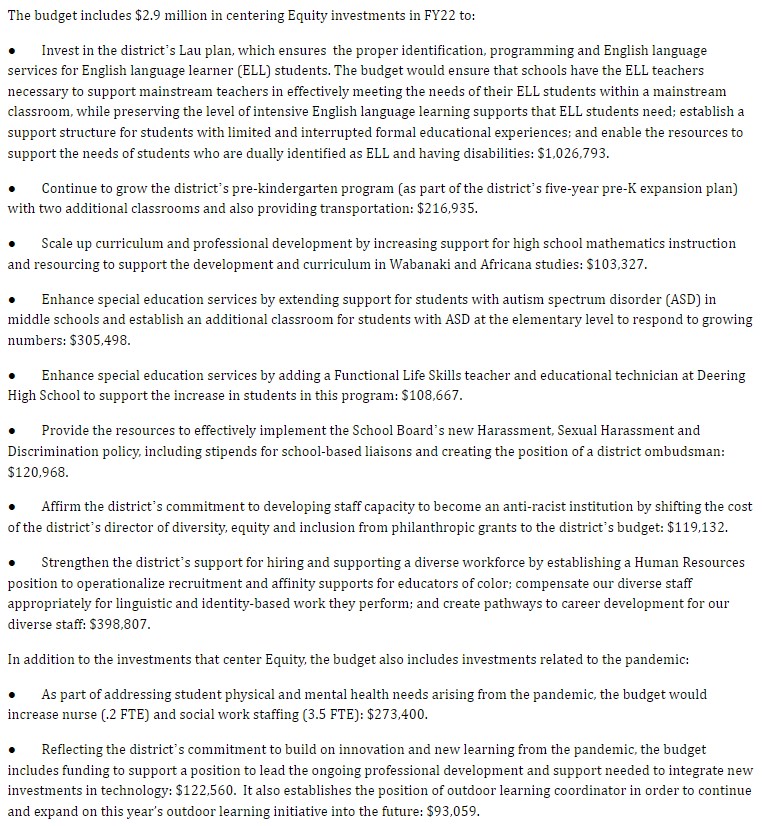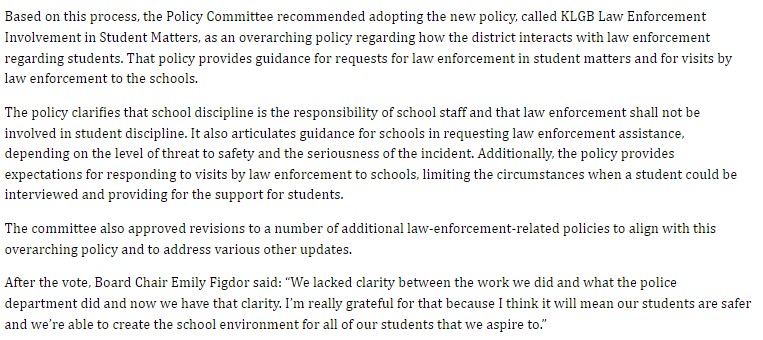
Portland Public Schools passes budget to invest “$2.9 million” in equity; claims that the budget “meets that moment” of a “racial reckoning”
Incidents
On June 15, 2021, the Board of Education for Portland Public Schools adopted a new equity policy. The policy states that the school district “recognizes the historical, generational, and compounding reality of the systems, structures, and practices that have created and continued to afford advantages to some groups while perpetuating inequities for others.” The policy provides definitions for the terms “equity,” “racial equity,” “equity lens,” “cultural humility,” and “equity literacy.” The definition of “equity” includes providing opportunities for students “that are reflective of their individual needs, identities and experiences.” The definition of “cultural humility” includes “self reflection in order to address assumptions or biases we may hold about others based on their identities.”
The policy states that all of the school district’s staff “are expected to participate in professional development opportunities related to equity.” This will include “topics focused on understanding historical, systemic and cultural biases and oppressions and the application of this knowledge to education.” The policy explains that the school district’s “educators and staff are responsible for bringing an equity lens to their work.” The policy also explains that the school district “recruits, hires, develops, and retains equity literate and linguistically diverse teachers, administrators, and staff who are racially diverse and reflect the cultures and identities of the student population served.”
The policy further explains that the school district will change its curriculum to focus more on equity: “PPS acknowledges that the curriculum taught in our schools has not been representative of the diverse and broad identities present in our system, and our practices have been inequitable, and we commit to redressing this inequity.” The school district will also “give opportunities to learn about and grapple with systemic racism and other uncomfortable historic truths.”
The school district will also utilize “land acknowledgements” going forward. The policy explains that “land acknowledgements are a way to recognize the history as well as the present of the place we live in.” These land acknowledgements can be used “for formal public gatherings (school board meetings, school wide events, large parent/community engagements) or as part of visual displays in buildings or spaces that are part of PPS.” The policy states that land acknowledgements “are a way of actively reflecting on the realities of colonization in the United States but do not stand alone.” Land acknowledgements will also be connected to the school district’s “broader curriculum.”

On April 13, 2021, the school district announced that the Board of Education voted to approve a “$125.2 million school budget proposal for the 2021-2022 school year.” A major theme of the budget was “Advancing Equity.” The school district explained that the budget included “$2.9 million in centering Equity investments in FY22.” The following are a few goals of the budget and how much these goals will cost:
- Scale up curriculum and professional development by increasing support for high school mathematics instruction and resourcing to support the development and curriculum in Wabanaki and Africana studies: $103,327.
- Affirm the district’s commitment to developing staff capacity to become an anti-racist institution by shifting the cost of the district’s director of diversity, equity and inclusion from philanthropic grants to the district’s budget: $119,132.
- Strengthen the district’s support for hiring and supporting a diverse workforce by establishing a Human Resources position to operationalize recruitment and affinity supports for educators of color; compensate our diverse staff appropriately for linguistic and identity-based work they perform; and create pathways to career development for our diverse staff: $398,807.

In the budget that the Board of Education approved, the cost of “Advancing Equity” is explained:
- Pre-K Promise Program Expansion: $216,935
- LAU Plan Implementation for ELL: $1,026,793
- Key Curriculum: $103,327
- Diversity Hiring and Support: $398,807
- Harassment Policy Implementation: $120,968
- Special Ed Program Support: $414,165
- Diversity, Equity and Inclusion Work: $119,132
The budget explains that “there are signs supporting Black Lives Matter all across our city and our businesses routinely put out press releases embracing racial equity.” The budget further explains that “young people and many others continue to push for a racial reckoning in city government, our police department, and, yes – in our schools.” The budget then claims that it “meets that moment.”
Portland Public Schools published a strategic plan for 2017-2020 with achieving “equity” as a goal. One strategy to achieve equity was to “build our awareness, understanding and skill in being culturally responsive so that all students feel understood, safe and empowered in school.” The term “culturally responsive” is often used to describe a method of teaching that includes the race and ethnicity of students as part of the lessons taught in classrooms.
On October 19, 2021, the school district’s Board of Education voted to adopt a new policy that limited the role of law enforcement in the school district in an effort to promote equity. The school district stated that “we sometimes have called police to help us manage difficult situations that we should be addressing ourselves.” A major component of the new law enforcement policy appeared to be updating “language for gender neutral pronouns.” The school district summarized the policy:
The policy clarifies that school discipline is the responsibility of school staff and that law enforcement shall not be involved in student discipline. It also articulates guidance for schools in requesting law enforcement assistance, depending on the level of threat to safety and the seriousness of the incident. Additionally, the policy provides expectations for responding to visits by law enforcement to schools, limiting the circumstances when a student could be interviewed and providing for the support for students.

Stay Informed
